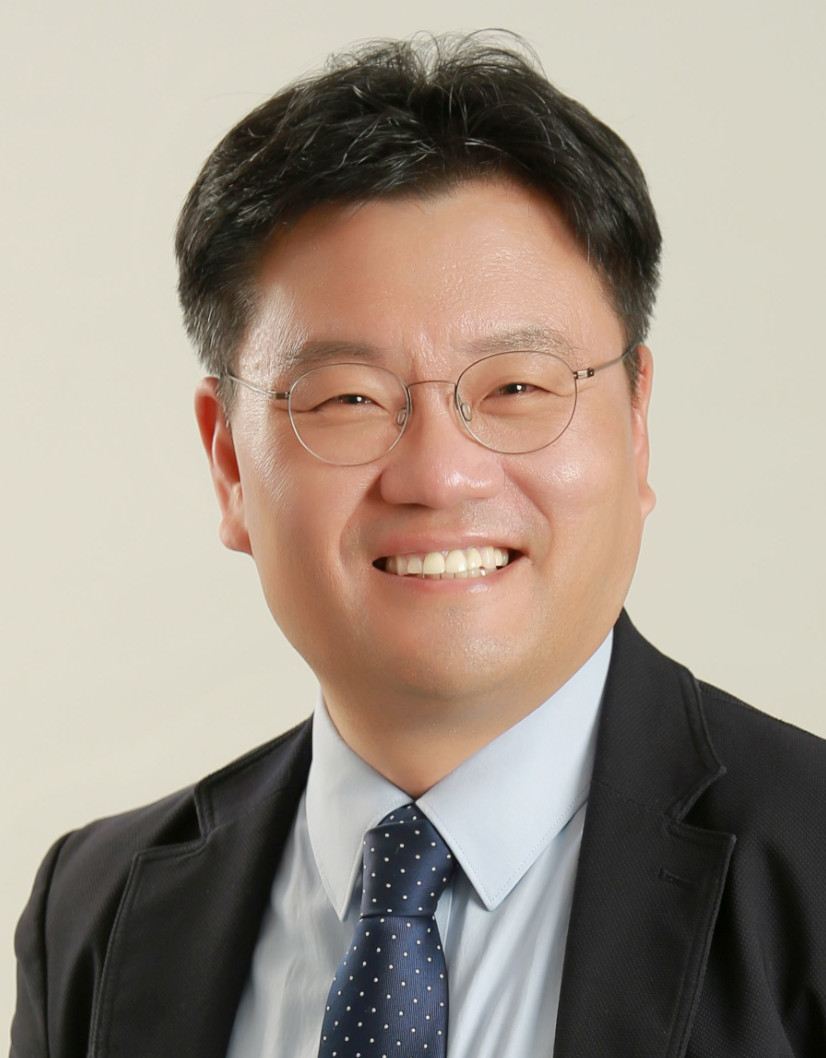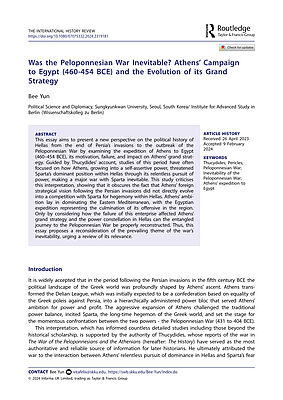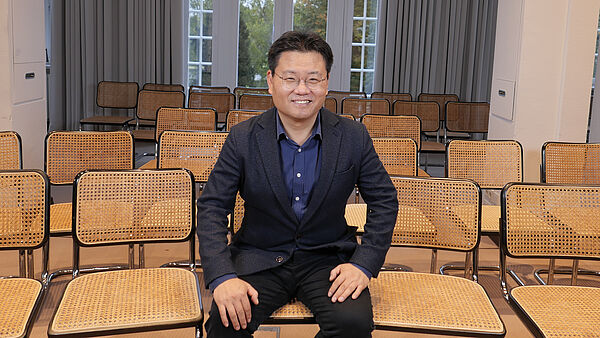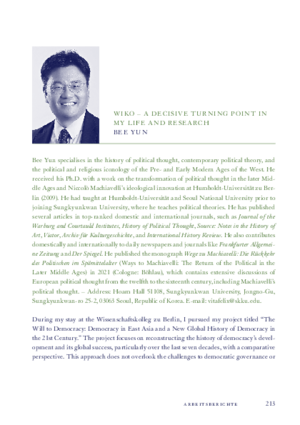
Bee Yun, Dr. phil.
Professor of Political Science
Sungkyunkwan University, Seoul
Born in 1968 in Seoul
Studied Political Science and International Relations at Seoul National University and Political Science at the Humboldt-Universität zu Berlin
Arbeitsvorhaben
The Will to Democracy. Democracy in East Asia and a New Global History of Democracy in the 21st Century
This project deals with a question that has been gaining in importance recently: how can one explain the worldwide rise of Western democracy from the 19th century to our time? The focus of the project is on the experience of the democracies in East Asia (Japan, South Korea, and Taiwan), whose success is reflected in their political stability, rapid economic growth, and, most recently, effective and successful management of the COVID-19 crisis. By historically and comparatively examining the paths to democracy in East Asia and comparing them with the European cases, the project aims to critically examine different explanatory models for the conditions and causes of the development of democracy and to produce new research approaches.Central to the considerations is the concept of the will to democracy, which is also the title of the project proposed here. The concept emphasizes the artificiality of modern democracy: artificiality in the sense that modern democracy, rather than being a natural evolution out of certain cultural characteristics, was rather an artificial product of thought and endeavor, in which a number of ideas played a core role (in philosophical terminology, they are called “values” precisely to denote their artificiality): the freedom of individuals, equality, and later human dignity and equal rights. They were supplemented by certain organizational principles of government. A society becomes democratic only when consensus is formed on those core values and principles. For this, they must be consciously propagated. Once democracy is established, it can survive and spread only if one persists in those values and principles and strives to develop them further. Democracy is thus based on a series of acts of will, both in its formation and in its survival.
The concept of the will to democracy is intended to mark precisely this centrality of the voluntaristic aspect. The insight gained through this project into the development of democracy in East Asia will finally serve to reflect on the state of democracy from a global perspective. By doing so, this project attempts, on the one hand, to reconstruct the various development paths of democracy from a global historical perspective and, on the other hand, to ask what prospects there are for democracy as a form of political and social life in our age.
Recommended Reading
Yun, Bee. “A Long and Winding Road to Reforming the Corrupt Republic: Niccolò Machiavelli’s Idea of the One-Man Reformer and His View of the Medici.” History of Political Thought 41, no. 4 (2020): 539–558.
—. Wege zu Machiavelli: Die Rückkehr des Politischen im Spätmittelalter. Cologne: Böhlau, 2021.
—. “The Scientist of Politics? The Typology of Princedoms in The Prince and Machiavelli’s Ambition as a Theorist of Human Action.” In Rethinking Medieval and Renaissance Political Thought: Historiographical Problems, Fresh Interpretations, New Debates, edited by Chris Jones and Takashi Shogimen, 59–86. London and New York: Routledge, 2023.
Kolloquium, 30.01.2024
Der Wille zur Demokratie. Die Entwicklung der koreanischen Demokratie und ihre Bedeutung in der weltweiten Demokratiekrise
Es wurde lange behauptet, die Demokratie sei eine natürliche politische Form der menschlichen Gesellschaft. Sie sei eine Folge und das Endziel der Entfaltung der Anlagen und Eigenschaften des Menschen, etwa seiner Liebe zur Freiheit, seiner Suche nach Gleichheit und der Fähigkeit zur Vernunft. Insofern sei die Demokratie ein Endpunkt der politischen Evolution der Menschheit.
Die gegenwärtige Krise, die mit dem scheinbar unaufhaltsamen Aufstieg des Populismus von rechts und links in letzter Zeit auch im Zentrum der westlichen Demokratien immer sichtbarer geworden ist, hat gerade diese Verankerung der Demokratie in den geistigen Anlagen und Werten des Menschen infrage gestellt. Es wird immer deutlicher, dass die Demokratie wie jede andere menschliche Erfindung und Institution geschichtlich aus dem Zusammenwirken unterschiedlicher Faktoren entsteht und sich entwickelt. Die Demokratie ist fragil. Sie kann jederzeit vergehen, wenn sie nicht gepflegt und geschützt wird.
Diese These wird anhand der demokratischen Erfahrungen in Südkorea erläutert, deren Erfolg im Sinne politischer Stabilität, schnellen wirtschaftlichen Wachstums und nicht zuletzt wirksamer und erfolgreicher Krisenbewältigung zunehmend Beachtung gefunden hat. Zentral für diese Überlegungen ist das Konzept des Willens zur Demokratie. Eine Gesellschaft wird nur dann demokratisch bleiben, wenn diese Verfassungsform bewusst ideologisch bearbeitet und propagiert wird. Damit betrachtet dieser Vortrag die Demokratie als Ergebnis einer Reihe von Willensakten, sei es eines Individuums oder einer Gruppe, einer Schicht oder einer Klasse, wie die koreanische Demokratie und ihre Erfolge und Misserfolge beweisen. Es wird auch versucht, diese Beobachtung der Zentralität der Willensakte als Grundlage für eine erfolgreiche Demokratie auf die demokratischen Erfahrungen in der Geschichte im europäischen Kulturkreis zu erweitern.
Es handelt sich hier um den ersten Schritt des Versuchs, die Realbedingungen der Geburt und des Fortlebens der Demokratie zu beleuchten, und dadurch einen Grund zu gewinnen, die Geschichte der Demokratie von ihrem Anfang in der Antike bis zu ihrer weltweiten Verbreitung nach dem Zweiten Weltkrieg neu zu betrachten.
Publikationen aus der Fellowbibliothek
Yun, Bee (New York, NY [u.a.], 2024)
Yun, Bee (Göttingen, 2021)
Yun, Bee (New York, NY [u.a.], 2021)
Persia and Pericles' grand strategy : was the Peloponnesian war a bipolar hegemonic war?
Yun, Bee (Berlin, 2021)
Culture of prognosis in the Medieval western Christian tradition of the Mirror-of-Princes
Yun, Bee (Wien, 2021)
Wege zu Machiavelli : die Rückkehr des Politischen im Spätmittelalter Beihefte zum Archiv für Kulturgeschichte ; Band 91


